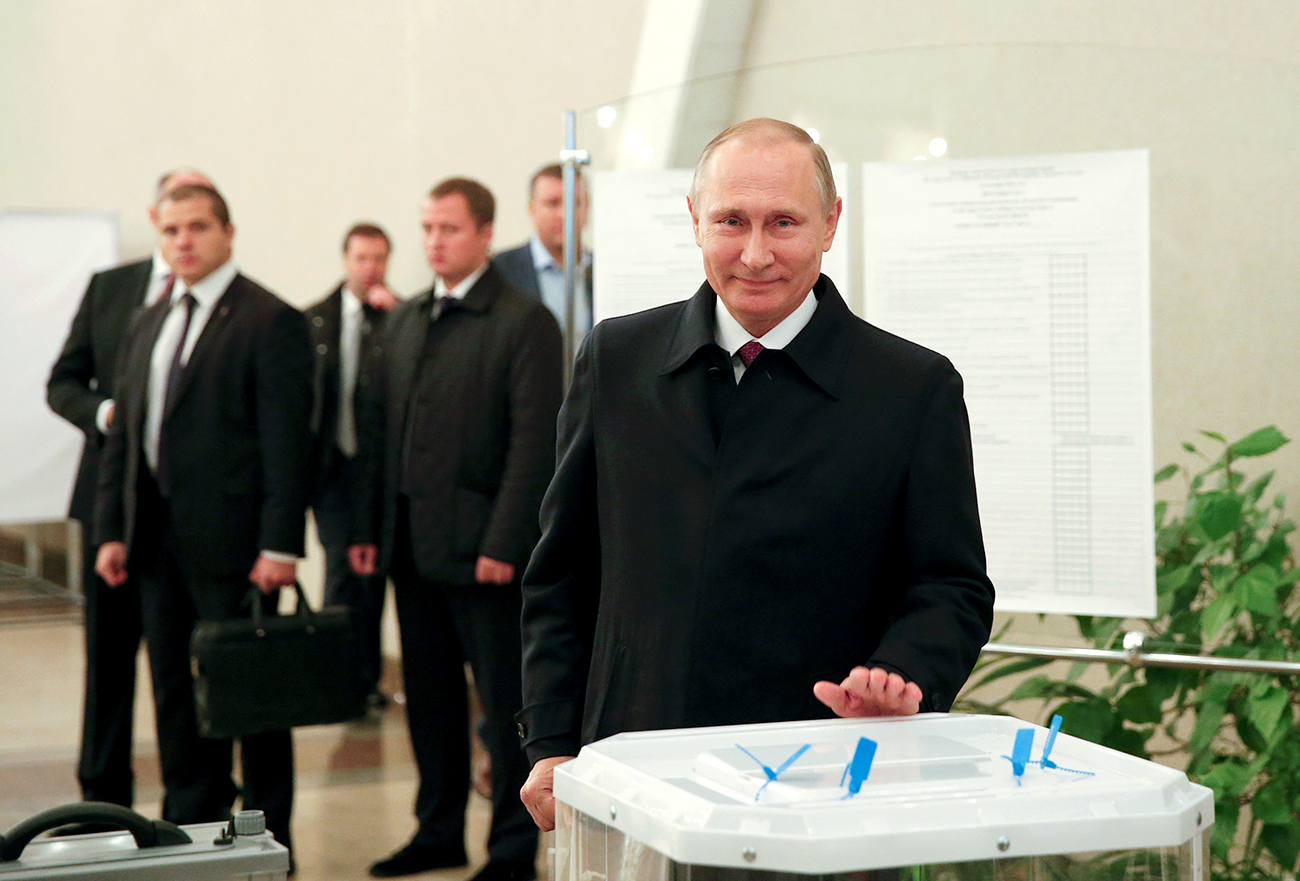A letter to Putin: Open Russia’s Khodorkovsky inspires Moscow protest
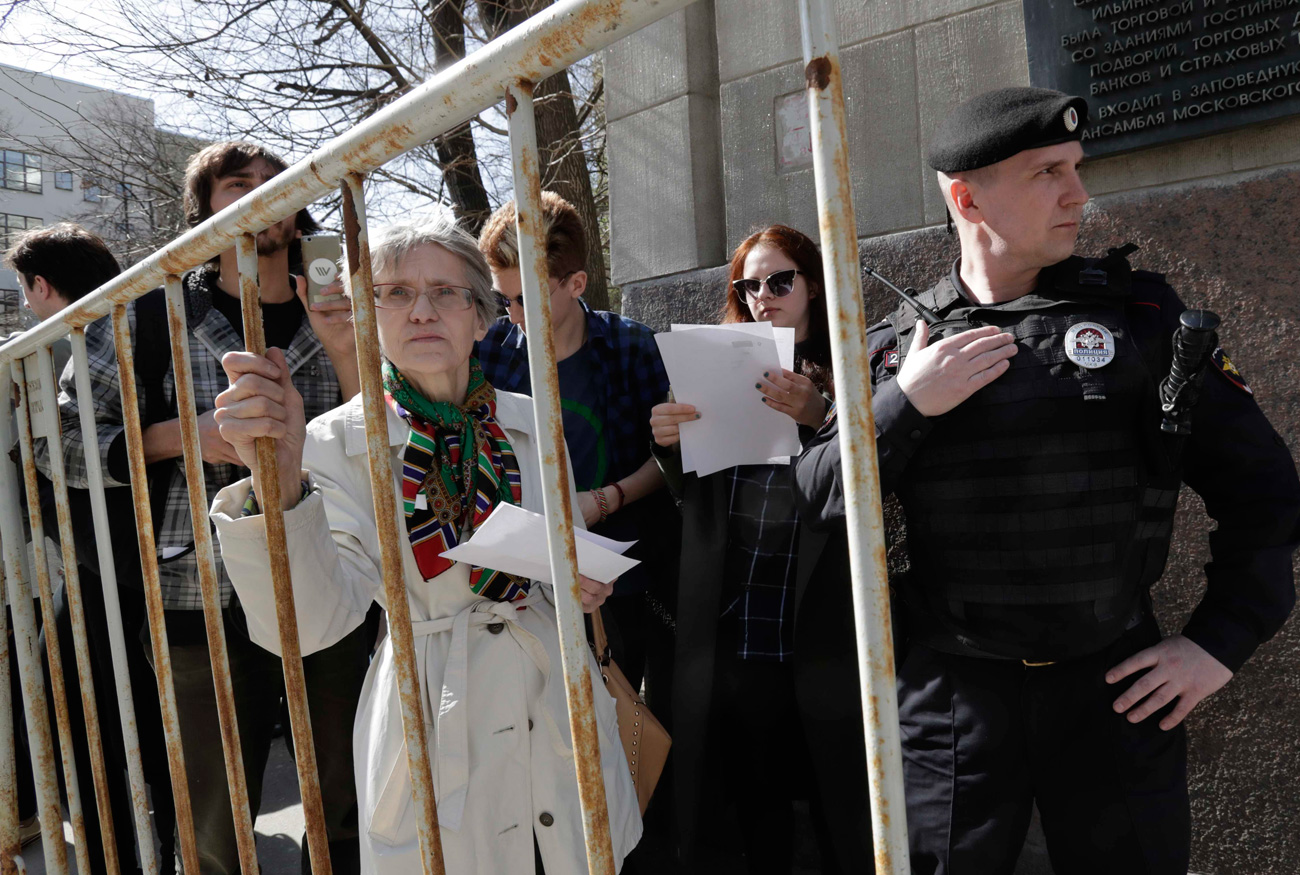
An Interior Ministry officer maintains order near people, who stand in a queue to get to an office of the presidential administration during an opposition protest in Moscow, on April 29, 2017.
ReutersOn April 29, people rallied in dozens of Russian cities under the banner “We are sick of him” — aimed against President Vladimir Putin running for another term in office. In some locations, the authorities had sanctioned a march, but in most cities, including Moscow, protests had not been authorized.
Organizers invited participants to come to their local presidential reception offices and submit individual letters to Putin asking him not to seek re-election. In the end, the protests ranged from a few dozen to several hundred people, while in the Russian capital around 250 people took to the streets (according to the Interior Ministry’s figures) and no arrests were made.
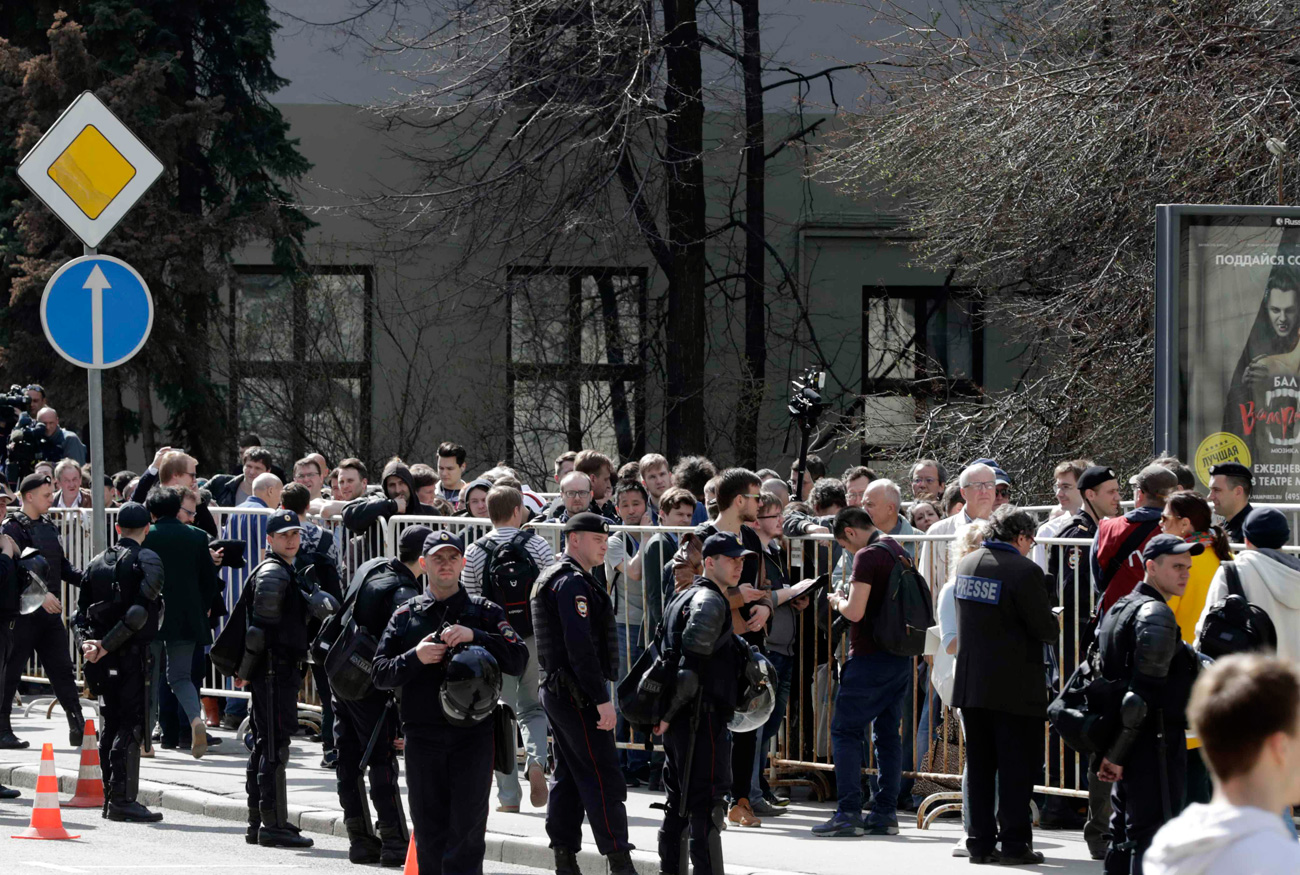 A queue to an office of the presidential administration, April 29, 2017. Source: Reuters
A queue to an office of the presidential administration, April 29, 2017. Source: Reuters
Preparations for the event had lasted about a month and involved a number of controversial publicity stunts, yet on the whole the protest attracted a very small number of people. RBTH attended the Moscow rally and spoke to its participants and organizers.
Nudity and police searches
The first announcement of the "We are sick of him" campaign appeared on social media right after opposition leader Alexei Navalny inspired thousands of people to hit the streets on March 26 to protest against corruption. At the time, Open Russia was still headed by ex-tycoon Mikhail Khodorkovsky, who has been living in London since his release from a Russian prison. Open Russia actively promoted the hashtag #надоело [Russian for "I'm sick of it all"] meaning sick of "the arbitrariness of judges and the police, corruption, poor roads, and lies on TV," as well as of well-known journalists from national TV channels, politicians, ministers, and the president.
Soon after the initial announcement, posters popped up at bus stops promoting the protest and free sweatshirts were handed out — special profile pictures were also created for social media. The latter prompted a bit of trolling on the part of the Russian Foreign Ministry, which also decided to tell the world what it was sick of.
(2) И нам тоже многое #надоело ! :)) #надоелpic.twitter.com/3SI6fTjYp6
— МИД России ?? (@MID_RF) 6 апреля 2017 г.
(3) И нам тоже многое #надоело ! :)) #надоелpic.twitter.com/3XHJ4tLSjo
— МИД России ?? (@MID_RF) 6 апреля 2017 г.
The promotion campaign culminated in a picture of a naked female breast, causing social media users to debate for several days "whether it was shameful to advertise an opposition protest with naked tits." In addition, Khodorkovsky quit as chairman of the Open Russia movement, which some users saw as a deliberate surrender, a shirking of responsibility and "a masterclass in 1990s realpolitik."
Yet, two days before the protest, Open Russia hit the headlines. The Russian Prosecutor General's Office declared that the London-based organization of the same name was undesirable on Russian territory (now almost any cooperation with the name can be prosecuted, though so far this does not apply to the Moscow-based movement), while Open Russia's Moscow office was subjected to a police search.
The new chairman of the movement, Alexander Solovyov, told RBTH that 22 police officers stormed the Open Russia office following a phone tip-off alleging that there were extremist materials stored there.
"They told us straight away that it was just an inspection, yet they banned us from using means of communication, did not let anyone in or out of the building, opened all the cabinets, doors, and the safe. They seized some 100,000 blank letter templates [for letters to the president], flags, draft documents, and even took blank A4 paper. And they seized five personal laptops, which was the most outrageous thing. Although that was absolutely illegal, so it was no longer an inspection but a search with confiscation. We did not see any protocols and did not sign them, they were not given to us," Solovyov said.
He added that Open Russia did not expect arrests during the protest and that its format had been changed specifically for that purpose: "People will simply be bringing written statements to an office that was specifically set up to receive letters from members of the public."Nevertheless, from 09:00 on April 29 morning there was increased police presence in central Moscow, as well as vans with riot police, while the presidential reception office was cordoned off.
‘It doesn’t matter who you support’
Given the month-long publicity campaign that preceded the protest, journalists expected a bigger turnout. However, an hour before the start of the event, there were just journalists gathered outside the presidential reception office. The organizers had asked participants to bring in their letters at 14:00 local time. At 13:55, the first protesters appeared, several of them. One of them asked the way to the reception office. For some reason, the other people present there assured him that "he would not be able to get there since there were police everywhere." Having offered to accompany him, just a couple of minutes later we arrived in the courtyard of the presidential reception office. The police had just checked our bags.
‘My name is Sasha. I've come here just to show my civic position, to say what I'm sick of.’
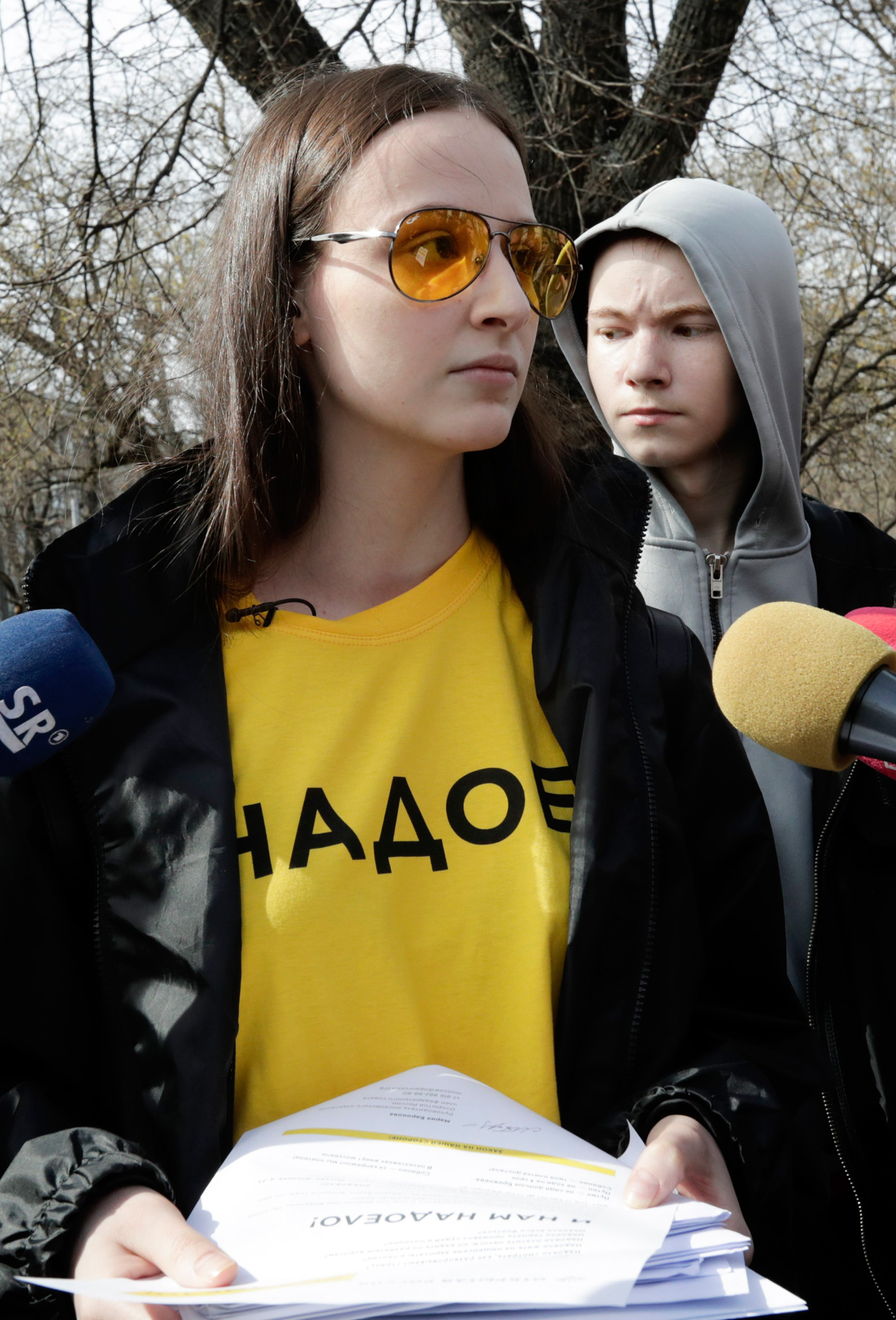 An activist holds leaflets during an opposition protest, calling for Putin not to run for another presidential term next year, in central Moscow, April 29, 2017. Source: Reuters
An activist holds leaflets during an opposition protest, calling for Putin not to run for another presidential term next year, in central Moscow, April 29, 2017. Source: Reuters
Sasha is surprised that there is no one here. His letter to the president says that "Russia has become a country in which life is unbelievably difficult, where a pensioner cannot survive on handouts from the state, while young people, even after graduating, have to wait for their parents to die so that they can have a place to live." Submitting a letter takes just a minute: We take the ticket, touch it to the barcode on the door, hand in the letter to a member of staff through a window and leave the way we came. Nobody reads the letter and at no stage is the person who has brought asked to show their passport.
"I did not think it would be so easy, honestly," Sasha says. He admits that supporting Navalny or Khodorkovsky does not matter to him, although he would not back the latter: "He himself is a former oligarch and he stole his fair bit in the early 1990s, when state property was being divided. The main thing is that we have a common enemy - a corrupt system.”
‘Do not copy, think for yourself!’
By the time we leave the courtyard of the reception office (at about 14:10) a crowd suddenly appears from the metro onto the narrow pavement (half of them are journalists). They head towards the reception office, but the police swiftly form them into a long queue. Now, handing in your letter will take at least an hour. Yet, people are prepared to wait. Some 40 riot policemen also appear from around the corner. But nothing else happens. On the other side of the road there are those who have not yet written their appeals or who engage passers-by in a political debate.
A man, who looks about 40, is writing his letter standing on the side of the road, murmuring: "Chap, you will not run for another term. You yourself adopted that law." His friend is waiting for the pen to become available. Then, after thinking for half a minute, he asks what he should write.
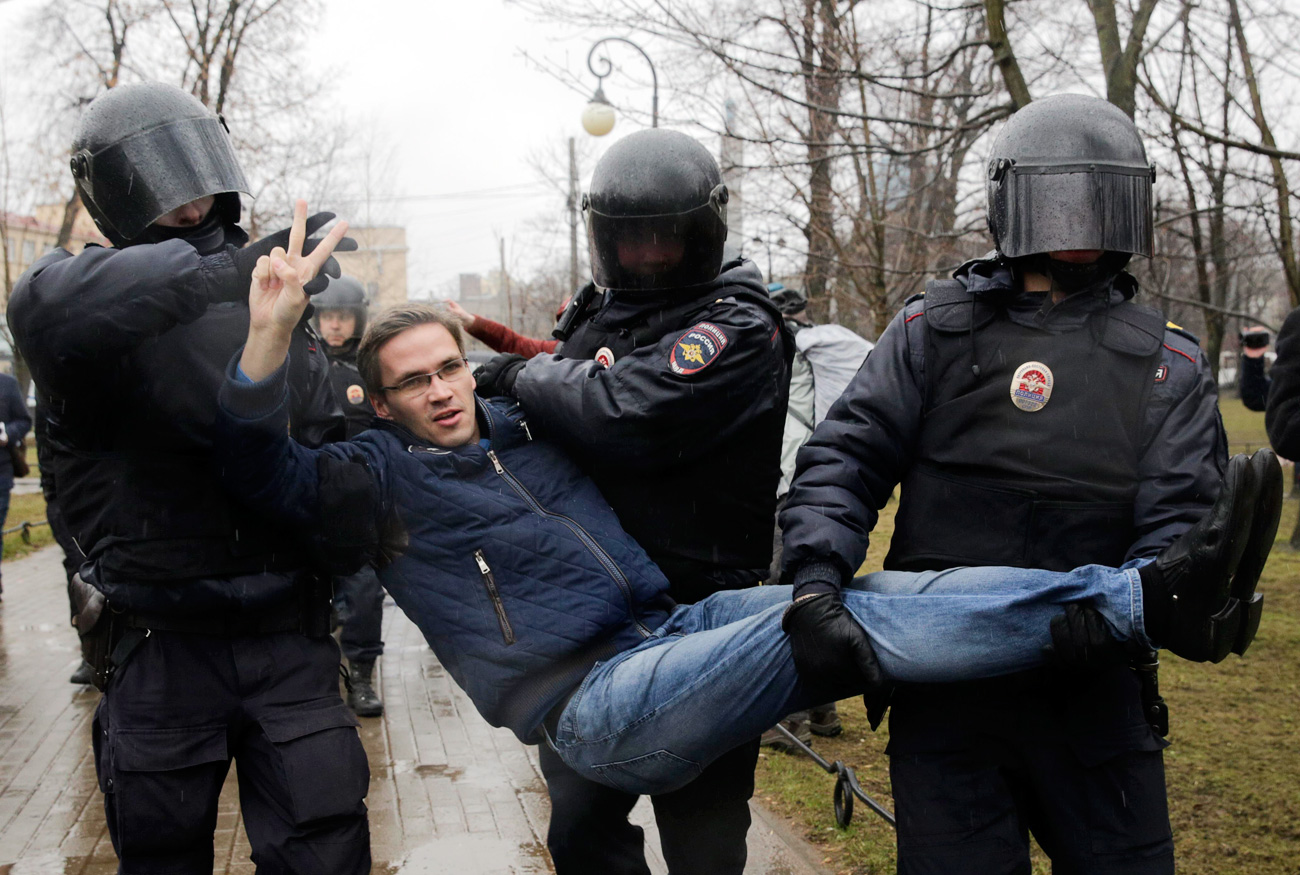 Interior Ministry officers detain a participant of an opposition protest in St. Petersburg, April 29, 2017. Source: Reuters
Interior Ministry officers detain a participant of an opposition protest in St. Petersburg, April 29, 2017. Source: Reuters
“Do not copy, think for yourself!” the 40-year-old one tells the other man, and then immediately starts dictating from his letter. “I demand that you observe the oath that you gave on the Constitution of the Russian Federation. That you remember that the Russian Federation is a federation, that governors cannot be appointed, that those in power should be regularly replaced. That's what you should write!”
I ask them who they are. They reply: "The new generation, a free one." After finishing a cigarette, the new generation determinedly walks to the end of the queue.
Read more: Will Russia ever revert back to a monarchy?
If using any of Russia Beyond's content, partly or in full, always provide an active hyperlink to the original material.
Subscribe
to our newsletter!
Get the week's best stories straight to your inbox
